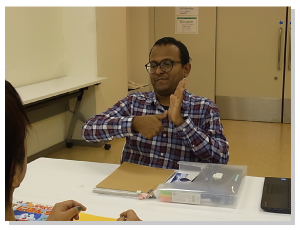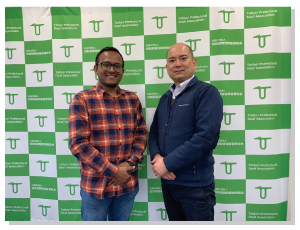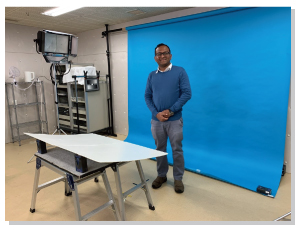Final Report
Awwam's Final Report
VISION TO EMPOWER AND STRENGTHEN THE MALDIVES DEAF ASSOCIATION
My name is Mohamed Awwam, one of the trainees of the 21st Duskin Leadership Training Program in Japan. I am from the Maldives. I heard about the Duskin Leadership Training program in 2018 from Ms. Dheena, a former Duskin trainee also from the Maldives. I decided to apply for this opportunity to study in Japan because I wanted to gain knowledge and experience on how to improve the functions and activities of Maldives Deaf Association (MDA) as we faced a lot of issues. There were four goals I wanted to achieve through this training program: 1) Creating and managing activities for the Deaf; 2) Training sign language interpreters; 3) Awareness-raising activities for the Deaf and sign language; 4) Observing Japan’s associations and organizations of/for the Deaf.
SITUATION OF DEAF COMMUNITY IN MALDIVES
The Maldives is an island nation in the Indian Ocean with a small population of around 400,000. There are 1,190 islands in the Maldives. There are 1,287 deaf/hearing-impaired persons living across the country, and only three sign-language interpreters in the capital city of Male. There are no interpreters in other inhabited islands. The hearing-impaired face many challenges due to the lack of interpreters. There is no system for interpreters in the Maldives to study further and experience how others in the field are working. Many of the islands where the hearing-impaired reside have no deaf organizations. The only organization is in the capital of Male. Deaf people in these islands do not have access to information because there are no interpreters. In most islands, deaf people cannot read our native language Dhivehi or English because there is no teaching for sign language. The sign language used by people in the capital city is different from that used by deaf people living on the islands. While those living in the capital city use a uniform, standard sign language, this is not the case in the islands. This lack of uniformity of sign language across the islands leads to communication gaps even within the deaf/hearing impaired community.
THREE MONTHS OF JAPANESE AND JAPANESE SIGN LANGUAGE STUDIES
During the first three months in Japan, I studied Japanese Sign Language (JSL) and Japanese language (Hiragana, Katakana and Kanji). I can understand written Hiragana and Katakana, but I found Kanji difficult to understand. I put a lot of effort into learning written Japanese. I found JSL highly interesting. Words are not enough to tell how much I appreciate the efforts of my JSL and Japanese language teachers.

TRAINING PROGRAMS I PARTICIPATED
As part of the group training, I participated in a leadership training program. The training consisted of various subjects. I learned about dealing with persons of various disabilities. I found leadership training to be most interesting as it equipped me with many skills. I want to create a similar program in Maldives for the deaf community to improve Deaf people’s knowledge and advocate for the basic rights for the Deaf.
HOMESTAY DURING THE OSHOGATSU (NEW YEAR) HOLIDAY
In December I had a great experience in Iwate prefecture through a homestay program. It was my first time experiencing snow and I enjoyed seeing it for first time. The family I stayed with was two deaf parents and their hearing daughter. We enjoyed several conversations together using sign language. During my stay we visited beautiful places in Iwate prefecture. I met my host family’s colleagues. They were extremely kind, amazingly friendly, and helpful to each other. It was one of the best experiences in my life.
MY INDIVIDUAL TRAINING
NPO Japanese ASL Signers Society (JASS):
At ASL, I was taught presentation skills. I learned presentation techniques that would support Maldives’ deaf community and culture. At the beginning, it was a bit difficult for me to explain information through presentation because I had never given a public presentation like that before, in Maldives. I have practiced many times. I created presentation slides about my life, Maldivian culture, and Maldives Deaf Association, which took about one hour to present. I was excited to deliver my presentation for the very first time. I really appreciate my teacher Ms. Kumiko for teaching me presentation techniques.
Okinawa Information Center for the Deaf:
In Okinawa, I saw deaf people living on islands just like in the Maldives. I observed that the central city sends deaf staff and interpreters to other islands when deaf people needed interpretation support. The city also offers the information deaf people living on other islands need. I visited a center for Telephone Relay Service. When a deaf person living on an island or in a city needed to make a video call, a sign language interpreter at the telephone relay center provided an interpretation service. I also learned about a sign language interpreter service the center provided, called Dispatch. It was an important service to bridge the barrier between deaf and hearing communities. With what I have learned from this experience, I would like to promote establishing similar services in Maldives’ island.
Tottori Association of the Deaf:
I met Mr. Ishibashi, the director of Tottori Association of the Deaf. It was fascinating to hear stories of the Deaf Movement. He said the slogan is “The Deaf Movement makes a Dream.” I was impressed. Mr. Ishibashi taught me leadership qualities and how to train as a leader, I was extremely happy to learn from his experience. I also learned about Deaf consultations (Deaf counselors) and events. I learned a lot from this experience and would like to promote similar activities in Maldives Deaf Association.

Hyogo Association of the Deaf:
The association has many departments, as well as a Senior Citizen Section, Women’s Section, Youth Section and Sport Department. I was fortunate enough to have the opportunity to learn about the women’s section and sports club. I hope to establish a women’s section, youth section and sports club in Maldives Deaf Association as well. Women’s section is important for solving problems in childcare, marriage, and family/relationship issues, and supporting the rights of deaf women. It will help Maldives’ women to exchange information in comfortable settings and conduct sessions to improve their knowledge on community life. I also learned about the Japan Institute for Sign Language Studies at Japan National Center of Sign Language Education, Kyoto. They research sign language and if new words appear they inform them to Deaf associations across Japan to discuss whether they should be added to sign language. The associations discuss the new words, taking opinions from all relevant groups. Once the signs are established, they create a video to show them. The video is then published on a website under the supervision of a selected team. All parties then comment and confirm the new signs for the discussed words. Following the approval, a new sign language book is published, including the new signs. This is something I would like the Maldivian Sign Language Team to implement for all the islands of Maldives. Apart from this, I also learned how to teach basic sign language. A video is shown to deaf persons in sign language, with hearing trainers reading out and writing down what the video is saying. I would like to publish a new sign language training textbook for people who wish to learn sign language.

MY GOALS AFTER RETURNING TO MY HOME COUNTRY
After going home, I want to achieve the following four goals for the Maldives Deaf Association.
1. Improving the Association’s Management and Activities: I would like to establish new associations in three islands; establishing a women’s section, youth section and senior citizens section. I want to create a place for deaf people to meet and learn programs together to improve their knowledge and empower themselves.
2. Developing Maldivian Sign Language: I would like to analyze and develop Maldivian Sign Language with the goal of creating a new sign language dictionary with more vocabulary. I want to research native sign languages from different islands and encourage all deaf people to learn native sign languages.
3. Developing Sign Language Interpreters: I want to develop the skills and numbers of sign language interpreters for the deaf community as deaf people need sign language interpreters in many areas of their life..
4. Community Advocacy and Information: I want to raise awareness in the community and advocate for the rights of PWD’s and sign language. I would especially like to promote the rights of deaf people, encouraging them to overcome barriers and establish a new normal. Bringing news and media access though sign language for the country.
Words of Gratitude
I would like to thank everyone from the Duskin AINOWA Foundation and Japanese Society for Rehabilitation of Persons with Disabilities. I will never forget all of you who supported me during the training. I would like to develop the Maldivian deaf community based on the knowledge I gained through the training period. I would never forget “the Deaf Movement Makes a Dream”. From the bottom of my heart, I am grateful to every one of you. Thank you for this beautiful journey in Japan.




